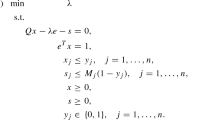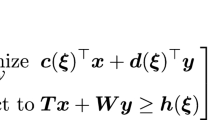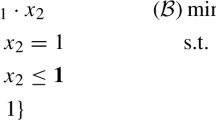Abstract
We consider sensitivity analysis for Mixed Binary Quadratic Programs (MBQPs) with respect to changing right-hand-sides (rhs). We show that even if the optimal solution of a given MBQP is known, it is NP-hard to approximate the change in objective function value with respect to changes in rhs. Next, we study algorithmic approaches to obtaining dual bounds for MBQP with changing rhs. We leverage Burer’s completely-positive (CPP) reformulation of MBQPs. Its dual is an instance of co-positive programming (COP), and can be used to obtain sensitivity bounds. We prove that strong duality between the CPP and COP problems holds if the feasible region is bounded or if the objective function is convex, while the duality gap can be strictly positive if neither condition is met. We also show that the COP dual has multiple optimal solutions, and the choice of the dual solution affects the quality of the bounds with rhs changes. We finally provide a method for finding good nearly optimal dual solutions, and we present preliminary computational results on sensitivity analysis for MBQPs.
We would like to acknowledge the support from ONR grant #N000142212632.
Access this chapter
Tax calculation will be finalised at checkout
Purchases are for personal use only
Similar content being viewed by others
Notes
- 1.
For convenience, we have written the dual variables with ‘negative sign’.
References
Anstreicher, K.M.: Testing copositivity via mixed-integer linear programming. Linear Algebra Appl. 609, 218–230 (2021). https://doi.org/10.1016/j.laa.2020.09.002. https://www.sciencedirect.com/science/article/pii/S0024379520304171
Badenbroek, R., de Klerk, E.: An analytic center cutting plane method to determine complete positivity of a matrix. INFORMS J. Comput. 34(2), 1115–1125 (2022)
Bomze, I.M., De Klerk, E.: Solving standard quadratic optimization problems via linear, semidefinite and copositive programming. J. Glob. Optim. 24, 163–185 (2002)
Brown, R., Neira, D.E.B., Venturelli, D., Pavone, M.: Copositive programming for mixed-binary quadratic optimization via Ising solvers. arXiv preprint arXiv:2207.13630 (2022)
Burer, S.: On the copositive representation of binary and continuous nonconvex quadratic programs. Math. Program. 120(2), 479–495 (2009). https://doi.org/10.1007/s10107-008-0223-z
Burer, S., Dong, H.: Representing quadratically constrained quadratic programs as generalized copositive programs. Oper. Res. Lett. 40(3), 203–206 (2012)
Celaya, M., Kuhlmann, S., Paat, J., Weismantel, R.: Improving the Cook et al. proximity bound given integral valued constraints. In: Aardal, K., Sanitá, L. (eds.) IPCO 2022. LNCS, vol. 13265, pp. 84–97. Springer, Cham (2022). https://doi.org/10.1007/978-3-031-06901-7_7
Conforti, M., Cornuéjols, G., Zambelli, G.: Integer programming models. In: Conforti, M., Cornuéjols, G., Zambelli, G. (eds.) Integer Programming. GTM, vol. 271, pp. 45–84. Springer, Cham Springer (2014). https://doi.org/10.1007/978-3-319-11008-0_2
Cook, W., Gerards, A.M.H., Schrijver, A., Tardos, É.: Sensitivity theorems in integer linear programming. Math. Program. 34(3), 251–264 (1986). https://doi.org/10.1007/BF01582230
Del Pia, A., Ma, M.: Proximity in concave integer quadratic programming. Math. Program. 194(1–2), 871–900 (2022)
Eisenbrand, F., Weismantel, R.: Proximity results and faster algorithms for integer programming using the Steinitz lemma. ACM Trans. Algorithms (TALG) 16(1), 1–14 (2019)
Feizollahi, M.J., Ahmed, S., Sun, A.: Exact augmented Lagrangian duality for mixed integer linear programming. Math. Program. 161, 365–387 (2017)
Granot, F., Skorin-Kapov, J.: Some proximity and sensitivity results in quadratic integer programming. Math. Program. 47(1–3), 259–268 (1990)
Gu, X., Ahmed, S., Dey, S.S.: Exact augmented Lagrangian duality for mixed integer quadratic programming. SIAM J. Optim. 30(1), 781–797 (2020)
Gu, X., Dey, S.S., Xavier, Á.S., Qiu, F.: Exploiting instance and variable similarity to improve learning-enhanced branching. arXiv preprint arXiv:2208.10028 (2022)
Guo, C., Bodur, M., Taylor, J.A.: Copositive duality for discrete energy markets (2021)
Johnson, E.S., Ahmed, S., Dey, S.S., Watson, J.P.: A K-nearest neighbor heuristic for real-time DC optimal transmission switching. arXiv preprint arXiv:2003.10565 (2020)
Kim, S., Kojima, M.: Strong duality of a conic optimization problem with a single hyperplane and two cone constraints. arXiv preprint arXiv:2111.03251 (2021)
Lee, J., Paat, J., Stallknecht, I., Xu, L.: Improving proximity bounds using sparsity. In: Baïou, M., Gendron, B., Günlük, O., Mahjoub, A.R. (eds.) ISCO 2020. LNCS, vol. 12176, pp. 115–127. Springer, Cham (2020). https://doi.org/10.1007/978-3-030-53262-8_10
Linderoth, J., Raghunathan, A.: Completely positive reformulations and cutting plane algorithms for mixed integer quadratic programs. INFORMS Annual Meeting (2022)
Majumdar, A., Hall, G., Ahmadi, A.A.: Recent scalability improvements for semidefinite programming with applications in machine learning, control, and robotics. Ann. Rev. Control Robot. Auton. Syst. 3, 331–360 (2020)
Nemhauser, G.L., Wolsey, L.A.: Integer and Combinatorial Optimization, vol. 55. Wiley, Hoboken (1999)
Shahidehpour, M., Yamin, H., Li, Z.: Market Operations in Electric Power Systems: Forecasting, Scheduling, and Risk Management. Wiley, Hoboken (2003)
Vavasis, S.A.: Quadratic programming is in NP. Inf. Process. Lett. 36(2), 73–77 (1990). https://doi.org/10.1016/0020-0190(90)90100-C. https://www.sciencedirect.com/science/article/pii/002001909090100C
Xavier, Á.S., Qiu, F., Ahmed, S.: Learning to solve large-scale security-constrained unit commitment problems. INFORMS J. Comput. 33(2), 739–756 (2021)
Author information
Authors and Affiliations
Corresponding author
Editor information
Editors and Affiliations
Rights and permissions
Copyright information
© 2024 The Author(s), under exclusive license to Springer Nature Switzerland AG
About this paper
Cite this paper
Cifuentes, D., Dey, S.S., Xu, J. (2024). Sensitivity Analysis for Mixed Binary Quadratic Programming. In: Vygen, J., Byrka, J. (eds) Integer Programming and Combinatorial Optimization. IPCO 2024. Lecture Notes in Computer Science, vol 14679. Springer, Cham. https://doi.org/10.1007/978-3-031-59835-7_33
Download citation
DOI: https://doi.org/10.1007/978-3-031-59835-7_33
Published:
Publisher Name: Springer, Cham
Print ISBN: 978-3-031-59834-0
Online ISBN: 978-3-031-59835-7
eBook Packages: Computer ScienceComputer Science (R0)




